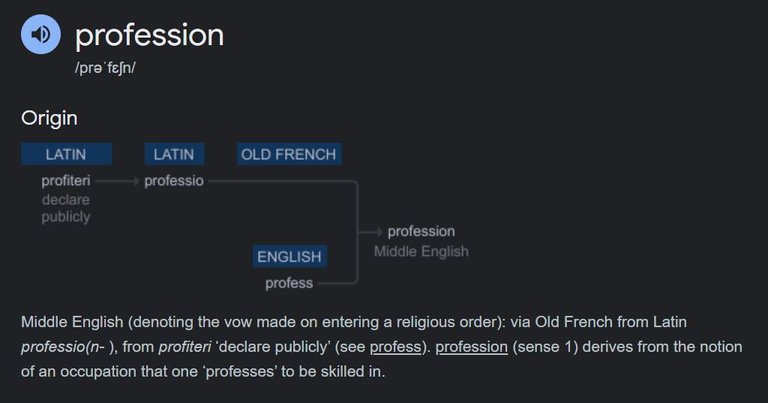Po raz kolejny dzięki swojej obecności na Hive trafiłem do zakątka Wszechświata o niezwykle niskiej entropii. Tym razem na zaproszenie @jocieprosza wybrałem się na konferencję katolickiego stowarzyszenia prawników dotyczącą sztucznej inteligencji. Zaznaczę tutaj, że @jocieprosza nie jest członkiem stowarzyszenia i generalnie to nie jest do końca jego środowisko.
Miałem dzisiaj parę tematów to załatwienia, a wciąż funkcjonuję z telefonem zastępczym, nie mam więc kalendarza, więc bez przypomnienia przegapiłbym ten event. Do końca nawet nie byłem pewien o czym dokładnie będzie mowa, ale rozumiecie, jestem prostym człowiekiem, zobaczyłem AI w nazwie to mi się oczka zaświeciły. To mógł być nawet wykład o roli AI w uprawie fasoli strączkowej, a ja bym tam trafił. Zmylił mnie nieco katolicki anturaż, religijne wydawnictwo jako miejsce wydarzenia, msza po, krzyże na plakacie, przez chwilę myślałem, że będzie o jakichś teologicznych implikacjach sztucznej inteligencji. W każdym razie bardzo się cieszę, że tam trafiłem.
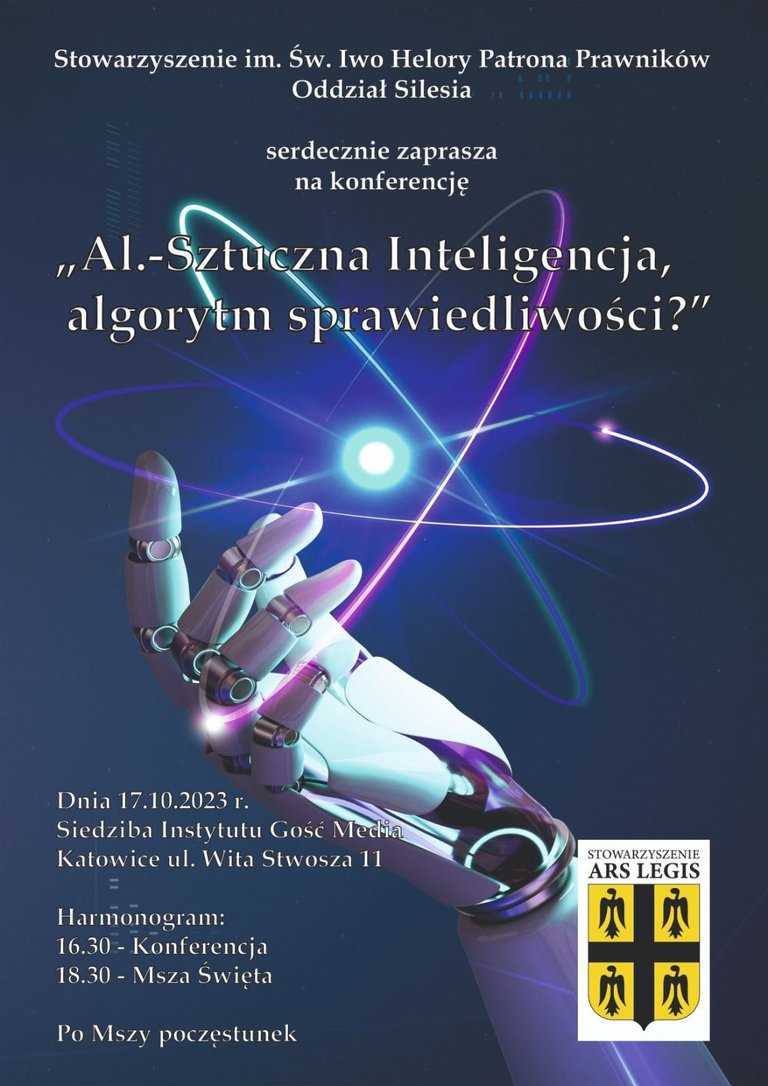
Doznałem lekkiego szoku, kiedy po wejściu zobaczyłem, że dosłownie wszyscy uczestnicy mieli na sobie garnitury. Dopiero po krótkiej chwili skojarzyłem, że przecież to są prawnicy w swoich strojach roboczych. Nie zmienia to faktu, że w swojej fioletowej bluzie z kapturem i żółtych spodniach czułem się jakbym dopiero wyszedł z pokładu statku kosmicznego. Nie zraziło mnie to jakoś bardzo, jest to coś, co mnie ostatnio bardzo interesuje, przenikanie się światów, spotkania odmiennych perspektyw. Moje doznania tylko się pogłębiły, gdy zaczął przemawiać pierwszy panelista. Wspinałem się na wyżyny skupienia aby nadążyć za Włochem mówiącym całkiem niezłą polszczyzną o interoperacyjności podmiotów gospodarczych wewnątrz Unii Europejskiej w zakresie adopcji nowych technologii. Przynajmniej tyle zrozumiałem...
Dużo ciekawszy z mojego punktu widzenia był drugi przemawiający, który skupił się na filozoficznej i historycznej stronie zagadnienia. Wiecie na przykład, że w średniowieczu były tylko trzy profesje? Lekarze, księża i prawnicy. Co więcej, do dzisiaj można znaleźć pewne powiązania między tymi zawodami, wszystkich obowiązuje tajemnica służbowa, wszyscy mają specjalne stroje służbowe, po których można ich od razu rozpoznać. Wszystkie te profesje wymagają również od człowieka bardzo silnego poczucia etyki zawodowej i znajomości łaciny. Wszyscy też składają przysięgę. Nawet słowo "profesja" wywodzi się etymologicznie od przysięgi.
A wiecie kto jest najbardziej znanym na świecie polskim prawnikiem? Ja wiedziałem. W drugiej klasie podstawówki absolutnie zdominowałem konkurs wiedzy o Mikołaju Koperniku. Kto by pomyślał, że kiedyś się to przyda. Wtedy wygrałem tylko pisaki, dzisiaj nie wygrałem nic ☹️
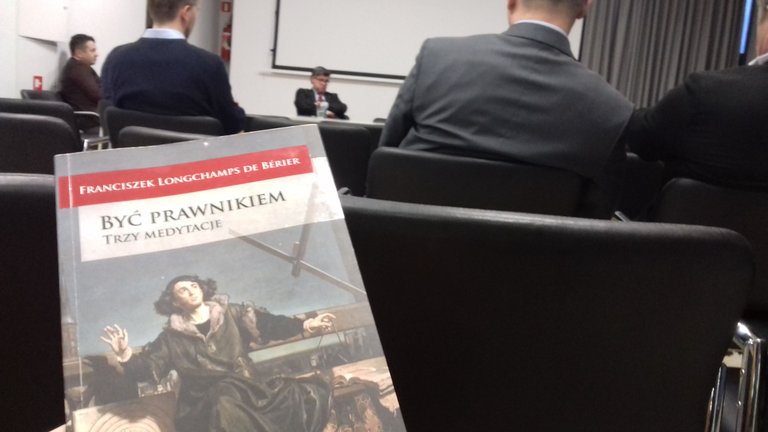
Główną tezą wykładu było powiązanie pracy prawnika z nieodłącznym aspektem relacji międzyludzkich. Intencją prawnika w tej optyce jest zawsze pomoc ludziom, a AI, jako coś niespełniającego ontologicznych przesłanek bytu, jest z założenia pozbawione intencji - ergo - nie może pomóc człowiekowi. Przynajmniej intencjonalnie. Rolą prawnika jest też oddanie sprawiedliwości zaangażowanym. Coś niesłychanie ludzkiego. Prowadzący wykład mecenas Karol Tatara naprawdę był o tym przekonany. Zaznaczyć wypada, że prowadzący zajmuje się pewną wąską dziedziną prawa i jestem sobie w stanie wyobrazić, że radca prawny doradzający przy restrukturyzacji podmiotów gospodarczych naprawdę może wyciągać ludzi z ciężkich tarapatów. Wierzę również, że kompetencje miękkie są w tym zawodzie niesłychanie istotne i klienci z pewnością wybiorą bardziej "ludzkiego" prawnika. Ja bym wybrał. Uważam, że warto o tym pamiętać, próbując delegować zadania sztucznej inteligencji, chociaż jako byt mogę mieć intencję użycia narzędzia w celu udzielenia pomocy samemu sobie.
Mam wielką nadzieję na merytoryczny komentarz od @jocieprosza pod spodem. Chciałbym jakoś zweryfikować ile sobie tutaj wyhalucynowałem, a jaka część mojej diagnozy może mieć sens, a zbyt długo nie mieliśmy okazji porozmawiać w czasie eventu. Jeśli chodzi o prawo to jestem laikiem. Co prawda w trakcie wydarzenia nie musiałem posiłkować się Googlem, żeby zrozumieć jakieś słowo, ale moja wiedza prawnicza jest raczej medialno-potoczna. Śledzę za to ostatnio dość uważnie temat rozwoju sztucznej inteligencji. Bardzo żałuję więc, że musiałem wyjść nieco wcześniej i nie zostałem na dyskusję. Mam wrażenie, że Panowie dość mocno przesiąkli własnym sosem, a ich opinie podszyte były troską (jeszcze nie strachem) o własne interesy. To mogłaby być naprawdę ciekawa wymiana zdań.
Cała konferencja odbyła się też pod znakiem nieco antycznej (3-4mies) wiedzy dotyczącej sztucznej inteligencji. Żarty o sześciu palcach czy nieanatomicznych kończynach są już mocno passe. Nie wzięto pod uwagi możliwości "nakarmienia" AI treściami aktów prawnych lub protokołami z rozpraw. Odnoszono się za to z sarkazmem do poprawności politycznej i generalnie naiwnych odpowiedzi produkowanych przez ChatGPT. W swoim ostatnim wpisie o AI pisałem też o systemach złożonych z wielu agentów, sztuczna inteligencja wchodząca w interakcje ze swoimi braćmi może ulepszać samą siebie. To dość nowy pomysł, którego prowadzący nie wzięli pod uwagę w swojej argumentacji.
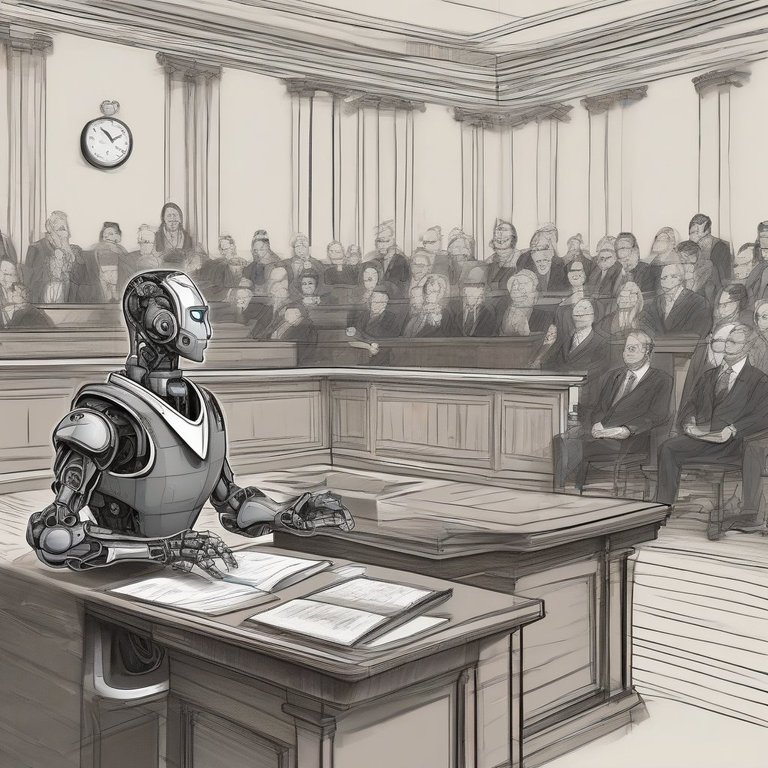
Z pewnej perspektywy rozumiem natomiast unikanie zaglądania w przyszłość. Podzielam opinię o włożeniu humanoidalnych prawników między bajki, przynajmniej na najbliższe lata. Uważam, że rozwój tej technologii jest zbyt szybki, żeby coś powiedzieć coś przyszłości z pewnością. Brakowało mi jednak zwykłego uznania faktu tej niepewności co do przyszłości. Zastanawiam się także na ile, konkretne ideologiczne nakierowanie organizatorów kształtowało przekaz, a na ile może to być linia poglądowa całego środowiska? Nie wiem. Ogólny ton wypowiedzi odbieram raczej jako próbę nakreślenia obrazu jak być powinno w Bożym świecie, niż próbę podjęcia dialogu z wizją technologicznej rzeczywistości najbliższej przyszłości. W końcu akty prawne tworzą naszą rzeczywistość tylko do pewnego stopnia, są też inne czynniki.
Czy AI zastąpi więc prawników?
Na tak postawione pytanie nie miałbym jednoznacznej odpowiedzi. Na pewno w pracy prawników jest cała masa bezmyślnych zadań, które ci zautomatyzowaliby bez mrugnięcia okiem. Podejrzewam, że podobnie jak w Lidlu nie mam zniżki na kasie samoobsługowej, tak ceny usług prawniczych, również tutaj nie zostałyby obniżone. Prawnik w takim wypadku stałby się gatekeeperem. W tej roli dużo bardziej wyobrażałbym sobie jakąś instytucję.
Jednak czy osławiona, magiczna niewidzialna ręka rynku nie ma na to innej optyki? Do lekarza również wolę iść osobiście, ale często korzystam z teleporady, bo akurat potrzebuję tylko recepty, tutaj już tylko krok to automatyzacji. Już teraz zresztą dr Google uspokaja miliony zmartwionych pacjentów. Inna sprawa, że kolejne miliony tylko martwią się bardziej. I w końcu, jak wiele osób lubiących pogawędki z taksówkarzami nie wybierze tańszego i bezpieczniejszego transportu autonomicznego? Ilu z nas skraca maile z pracy przy pomocy AI? Wyobrażam sobie, że dla wielu osób w tym lub innym spektrum, tego typu kontakty są przykrą koniecznością, lub nawet poważnym wyzwaniem życiowym. Wybór jest fajny. Jestem też na stanowisku, że AI nie zabije interakcji międzyludzkich, natomiast z pewnością zmieni ich kształt. To jest fundamentalna ludzka potrzeba. Generalne stwierdzenie dla pobudzenia wyobraźni.
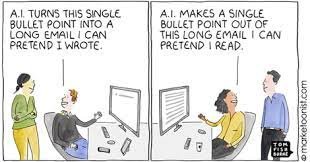
Wyobrażam sobie pewien okres przejściowy, w którym niezbędni będą konsultanci, gatekeeperzy i osoby zajmujące się redakcją dokumentów. Być może nawet całe instytucje lub firmy. Im bardziej złożone sprawa tym dłużej niezbędna będzie taka asysta i prawdopodobnie minie jeszcze dużo czasu zanim ktoś rzeczywiście straci pracę na rzecz robota. Ostatecznie wyobrażam sobie, że więcej i więcej zadań będzie mogło być oddelegowanych.
Kolejnym ciekawym czynnikiem wartym rozważenia jest cena usług. Pewnie, że wolałbym mieć elegancki stół od snycera, codziennie świeże jedzenie od uśmiechniętego eko-rolnika i ilustracje do postów od mojej przyjaciółki graficzki, jednak czy mnie ta to stać? Tak średnio. W ten sposób, licencjonowane (tak, temat zaufania również był podnoszony) modele AI do tworzenia wniosków lub umów za parę lat mogłyby zdemokratyzować dostęp do usług prawniczych. Kim jest Pan jeden prawnik z drugim, aby ograniczać dostępność tego typu usług? Jeśli sztucznie produkowane dokumenty będą nie do odróżnienia to czy uzasadnione będzie lobbowanie za płaceniem za pieczątki? Czy ustawodawca będzie w stanie to kontrolować?
Pozostaje też temat wpływu smart kontraktów i blockchaina na kwestie umów i aktów notarialnych, to będzie jednak tworzenie się zupełnie nowej rzeczywistości prawnej na poziomie meta, z nowymi zasadami i instytucjami. Jest to coś co wykracza poza temat tego wpisu.
Faktem jest, że adopcja AI przez osoby zajmujące się legislaturą lub nawet przez osoby zaangażowane w procesy sądowe będzie jednym z pierwszych poważnych sprawdzianów dla tej technologii. Podobnie jak wycena projektów kryptowalutowych mówi wiele o ich technologicznej niezawodności, tak wartość AI pozwów będzie wyznacznikiem niezawodności AI.
Na ten moment odważyłbym się zapytać AI o napisanie przykładowego statutu stowarzyszenia, lub umowy kupna/sprzedaży pojazdu, natomiast z pewnością porównałbym to z dokumentem znalezionym w necie. Po projekt intercyzy lub umowę założenia spółki już bym się do sztucznej inteligencji nie zgłosił. Czujecie różnicę? Utworzenie odpowiedniej apki jest jednak tylko kwestią znalezienia się zespołu zaangażowanych programistów. To co przyszło mi natomiast do głowy to AI papuga. Pamiętajcie, że znam to z filmów, ale wyobrażam sobie ten moment, kiedy oskarżony jest pytany czy chce adwokata z urzędu, ma swojego, czy chce sam siebie reprezentować. "Wysoki sędzio, panie prokuratorze, chcę być reprezentowany przez sztuczną papugę." Taki model AI nakarmiony wcześniej danymi z kodeksów i protokołami z podobnych spraw podpowiada do ucha w czasie rzeczywistym, co podsądny powinien powiedzieć. Przed procesem ustala się linię obrony, wprowadza istotne dla procesu dane i lecimy. Fizycznie byłaby to dyskretna słuchawka.

Jakie etyczne implikacje przychodzą mi do głowy? Z jednej strony (po dopracowaniu technologii) wszyscy podsądni mieliby potencjalnie dostęp do prawnika na najwyższym poziomie. Mam wrażenie, że powszechna percepcja obecnie jest taka, że pieniądze grają dużą rolę na sali sądowej. Ciężko mi postawić słowa "urynkowienie" i "sprawiedliwość" obok siebie. Wiecie o czym piszę? Z drugiej strony statystycznie będą zapadać krótsze wyroki i więcej przestępców zostanie na wolności. No chyba, że wprowadzimy syntetycznych prokuratorów... Oj coś czuję, że nie obyłoby się bez głębszych zmian w prawie.
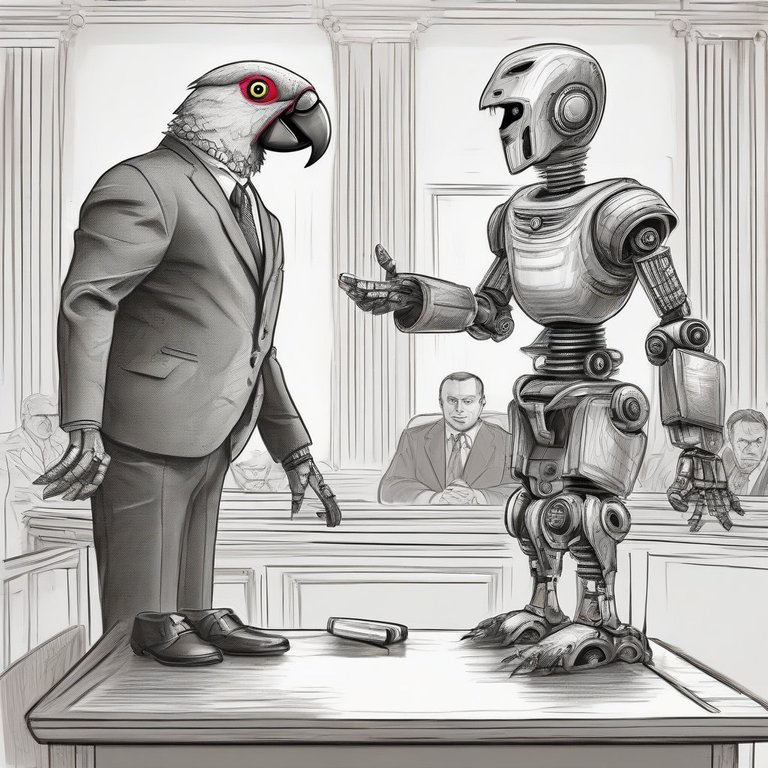
Podkreślić należy natomiast, że tego typu technologia to nie jest fantastyka naukowa. Wszystkie klocki już są, wystarczyłoby je połączyć. Wiarygodność i kwestia zachowania tajemnicy to pewne wyzwania. Kto wie czy w kodzie nie będzie tylnej furtki, która pozwoli na zbieranie danych o rozmowach z oskarżonymi? Wypadałoby więc, żeby tego typu oprogramowanie było open-source. Pozostaje jeszcze kwestia atestacji. Czy znajdą się prawnicy gotowi stworzyć odpowiednie instytucje? Nieco poniosła mnie fantazja w temacie, w którym nie czuję się ekspertem. Prawo karne zresztą jest chyba najbardziej kontrowersyjne. Mam w sumie więcej pytań niż odpowiedzi. Czy obecne przepisy o postępowaniu karnym zabraniają tego typu reprezentacji w sądzie? Czy protokoły z rozpraw są dostępne publicznie? Jakie inne implikacje niesie za sobą stosowanie takiej technologii?
Skoro wspomniałem już o etyce odniosę się może do słonia w pokoju. Wszystkie trzy wspomniane wcześniej profesje w różnym stopniu mierzą się obecnie z kryzysem wspomnianej wcześniej etyki zawodowej. Oczywiście nie dotyczy to wszystkich przedstawicieli tych zawodów. Problem jest raczej systemowy i związany z koncentracją władzy i odpowiedzialności w rękach nielicznych. Może będę monotematyczny, ale na klawiaturę pcha mi się słowo "centralizacja". Bo czy prawnik nie jest pośrednikiem w kontakcie między obywatelem a państwem? Monopol na kontakt z Bogiem to już absolutne wyjście poza skalę, ale tak pacjenci, jak i klienci prawników też często są bez wyboru, kiedy korzystają z tych usług. I chociaż zarobki pozwalające na utrzymanie się w wyższej klasie średniej powinny teoretycznie oddalać pokusy to w praktyce wygląda to różnie. Z pewnością są to ludzie mierzący się na co dzień z bardzo wysoką odpowiedzialnością. Czy mamy odpowiednie procedury weryfikacji kompetencji etycznych do wykonywania tych zawodów? I chociaż jesteśmy wszyscy tylko ludźmi, to wszyscy wiemy jak czarne owce potrafią psuć opinię.
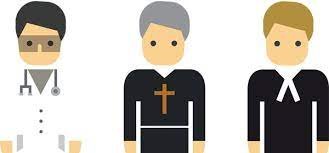
Nie twierdzę tu, że sztuczna inteligencja jest rozwiązaniem tych wyzwań. Dużo będzie zależało od regulacji dotyczących sztucznej inteligencji, a więc od... prawników. Potencjalnie możemy mieć natomiast do czynienia z czynnikiem wywierającym presję konkurencyjną. Być może, podobnie jak z rękodzielnikami, zostaną najlepsi w swoich profesjach. JesusGPT to już rzeczywistość!
Czy problem syntetycznych prawników nie jest nieco podobny do oddania sterów samochodu robotom? Powszechne narracje zdają się twierdzić, że mniejszy odsetek błędów nie wystarczy aby nas, ludzi przekonać. Kwestia przekazania kontroli to również nie wszystko, wydaje się, że na szali jest już percepcja naszego własnego człowieczeństwa. Czy jesteśmy gotowi zmierzyć się z takim kryzysem egzystencjalnym? Przychodzi mi do głowy cała masa innych zawodów, gdzie przebranżowienie w związku z rozwojem AI będzie dla ludzi dużo większym wyzwaniem. Zarówno lekarze, księża jak i prawnicy z założenia charakteryzują się wysoką empatią, wytrwałością, umiejętnością nauki przez całe życie i szerokimi horyzontami w związku z interakcjami z tak różnymi przecież ludźmi. Ten niesamowity zestaw skillsów jest niewątpliwym skarbem dla ludzkości, a przecież to nie tak, że brakuje nam wyzwań, prawda?
[ENG]
Once again, thanks to my presence on Hive, I found myself in a corner of the Universe with an incredibly low entropy. This time, at the invitation of @jocieprosza, I attended a conference of a Catholic lawyers' association on artificial intelligence. I should note here that @jocieprosza is not a member of the association, and it's not really his environment.
I had a few things to take care of today, and I'm still using a temporary phone, so I don't have a calendar. Without a reminder, I would have missed this event. I wasn't even sure what exactly would be discussed, but you know, I'm a simple person - I saw AI in the name, and my eyes lit up. It could have been a lecture on the role of AI in growing green beans, and I would have still attended. The Catholic atmosphere tricked me a bit, the event being held at a religious publishing house, a Mass afterwards, crosses on the poster - for a moment, I thought it would be about some theological implications of artificial intelligence. In any case, I'm very glad I ended up there.

I experienced a slight shock when I entered and saw that literally all the participants were wearing suits. It took me a short while to realize that they are lawyers in their professional attire. This didn't change the fact that in my purple hoodie and yellow pants, I felt like I had just stepped off a spaceship. It didn't discourage me too much; it's something that has been of great interest to me lately, the intersection of worlds and encounters with different perspectives. My experiences deepened when the first panelist began to speak. I was trying to stay focused to keep up with an Italian man speaking Polish, discussing the interoperability of business entities within the European Union in the adoption of new technologies. At least that's what I understood...
Much more interesting from my perspective was the second speaker, who focused on the philosophical and historical aspects of the topic. Did you know, for example, that in the Middle Ages, there were only three professions? Doctors, priests, and lawyers. Furthermore, you can still find certain connections between these professions today - they all adhere to professional secrecy, they all have special uniforms that make them easily recognizable, and all of these professions require a strong sense of professional ethics and knowledge of Latin. They all also take an oath. Even the word "profession" etymologically comes from the oath.
And do you know who the most famous Polish lawyer in the world is? I knew. In the second grade of primary school, I absolutely dominated a competition about Nicolaus Copernicus. Who would have thought that it would come in handy someday? Back then, I only won some pens; today, I didn't win anything ☹️

The main thesis of the lecture was the connection between a lawyer's work and the inherent aspect of interpersonal relationships. From this perspective, a lawyer's intention is always to help people, and AI, as something that doesn't meet the ontological prerequisites of being, is inherently devoid of intention - ergo - it cannot help humans, at least intentionally. Another role of a lawyer is to ensure justice for the parties involved, which is something incredibly human. The lecturer, Attorney Karol Tatara, truly believed in this perspective. It's worth noting that the lecturer specializes in a narrow area of law, and I can imagine that a legal advisor assisting with the restructuring of business entities can genuinely help people in difficult situations. I also believe that soft skills are incredibly important in this profession, and clients will certainly choose a more "human" lawyer. I would too. I think it's important to remember this when delegating tasks to artificial intelligence, although as an entity, I can have the intention of using a tool to help myself.
I hope to receive a substantive comment from @jocieprosza below. I would like to somehow verify how much of what I've hallucinated here, and what part of my diagnosis might make sense, as we didn't have the opportunity to chat during the event for too long. I am a layperson when it comes to law. While I didn't need to use Google during the event to understand some words, my legal knowledge is more of a popular and media nature. However, I have been following the development of artificial intelligence quite closely lately. I regret that I had to leave a bit early and couldn't stay for the discussion. I have the impression that the gentlemen were quite immersed in their own world, and their opinions were tinged with concern (not yet fear) for their own interests. It could have been a really interesting exchange of views.
The whole conference also took place under the sign of somewhat outdated (3-4 months old) knowledge about artificial intelligence. Jokes about six fingers or non-anatomic limbs are already quite passé. The possibility of "feeding" AI with legal documents or court protocols wasn't taken into consideration. Instead, there was sarcasm directed at political correctness and generally naive responses produced by ChatGPT. In my last post on AI, I also wrote about systems composed of multiple agents, artificial intelligence interacting with its peers can improve itself. This is a fairly new idea that the presenters did not consider in their technological arguments.

From a certain perspective, I understand the avoidance of looking into the future and sticking to what we know now. I share the opinion about dismissing the idea of humanoid lawyers, at least for the near future. I believe that the development of this technology is too rapid to make any certain predictions about the future. However, I missed a simple acknowledgment of this uncertainty about the future. I also wonder to what extent the specific ideological direction of the organizers shaped the message, and to what extent it might be the prevailing view of the entire community? I don't know. The general tone of the discussions comes across more as an attempt to outline how things should be in God's world rather than an attempt to engage in a dialogue with the vision of the technological reality of the near future. After all, legal acts shape our reality only to a certain extent; there are other factors at play too.
So, will AI replace lawyers?
To such a question I wouldn't have a straightforward answer. Certainly, there are many routine tasks in lawyers' work that could be automated without hesitation. I suspect that, just as in a supermarket like Lidl, I don't get a discount at the self-checkout, the prices of legal services wouldn't necessarily decrease in such a scenario. In this case, the lawyer would become a gatekeeper, and I could imagine some institution playing a more efficient role in this position.
However, does the infamous "invisible hand of the market" have a different perspective on this? I also prefer to see a doctor in person, but I often use telemedicine when I just need a prescription, and that's already a step towards automation. Already, Dr. Google reassures millions of worried patients. However, many more people end up worrying even more. And finally, how many people who enjoy chatting with taxi drivers won't choose cheaper and safer autonomous transportation? How many of us shorten work emails with the help of AI? I imagine that for many people across various spectrums, these kinds of contacts are an unpleasant necessity or even a significant life challenge. Choice is a good thing. I also believe that AI won't kill human interactions, but it will certainly change their form. This is a fundamental human need. A general statement to stimulate the imagination.

I can imagine a transitional period where consultants, gatekeepers, and document editors will be essential. Perhaps even entire institutions or companies. The more complex the case, the longer such assistance will likely be needed, and it will probably be a long time before someone actually loses their job to a robot. Ultimately, I imagine that more and more tasks could be delegated.
Another interesting factor worth considering is the cost of services. Of course, I would prefer to have an elegant dining table crafted by a woodworker, fresh food every day from a smiling eco-farmer, and illustrations for my posts from my graphic designer friend. But can I afford it? Well, not really. In this way, licensed (yes, the issue of trust was also raised) AI models for creating applications or contracts could democratize access to legal services in a few years. Why would lawyers be able to limit the availability of such services? If artificially generated documents are indistinguishable, will lobbying for stamp fees be justified? Will the legislator be able to control it?
There is also the issue of the impact of smart contracts and blockchain on matters of agreements and notarial acts. However, this is the creation of an entirely new legal reality on a meta-level, with new rules and institutions. This goes beyond the scope of this post.
The fact is that the adoption of AI by those involved in legislation or even those involved in legal processes will be one of the first serious tests for this technology. Just as the valuation of cryptocurrency projects says a lot about their technological reliability, the value of AI lawsuits will be an indicator of AI's reliability.
At this point, I would dare to ask AI to write a sample association statute or a vehicle purchase/sale agreement, but I would certainly compare it with a document found on the internet. When it comes to a prenuptial agreement or a company formation agreement, I wouldn't turn to artificial intelligence. Do you feel the difference? Creating the right app is simply a matter of finding a team of dedicated programmers though.
What came to my mind is an AI parrot. Remember, I know this from movies, but I can imagine the moment when the accused is asked if they want a court-appointed attorney, have their own, or want to represent themselves. "Your Honor, Mr. Prosecutor, I want to be represented by an artificial parrot." Such an AI model, previously fed with data from legal codes and records of similar cases, whispers in real-time what the defendant should say. Before the trial, the defense strategy is established, relevant data for the case are introduced, and we're off. It would be a discreet earpiece.

When considering the ethical implications, several thoughts come to mind. On one hand, after the technology is refined, potentially, all defendants could have access to top-level legal representation. There is a prevailing perception that money plays a significant role in the courtroom. It's hard for me to juxtapose the words "commercialization" and "justice." You know what I mean? On the other hand, statistically, shorter sentences might be handed out, and more criminals could remain free. Unless we introduce synthetic prosecutors... I have a feeling that deeper changes in the law would be necessary to address these potential consequences.

It should be emphasized that this type of technology is not science fiction. All the building blocks are already there; it would be a matter of connecting them. Credibility and the issue of maintaining confidentiality are certain challenges. Who knows if there won't be a backdoor in the code that allows for data collection from conversations with the accused? Therefore, this type of software should ideally be open-source. The issue of certification remains. Will there be lawyers willing to create the appropriate institutions? I got carried away with fantasies in a field where I don't feel like an expert. And on the top of that criminal law is probably the most controversial. At the end, I have more questions than answers. Do current criminal procedural laws explicitely prohibit such representation in court? Are historic court transcripts publicly accessible? What other implications come with the use of such technology?
Since I've already mentioned ethics, I'll address the elephant in the room. All three of the aforementioned professions are currently dealing to some extent with the crisis of professional ethics. Of course, this doesn't apply to all representatives of these professions. The problem is rather systemic and related to the concentration of power and responsibility in the hands of a few. Maybe I'm a bit repetitive, but the word "centralization" keeps coming to mind. Because isn't a lawyer a mediator in the relationship between a citizen and the state? A monopoly on contact with God is an absolute scale beyond that, but both patients and clients of lawyers often have no choice when they use these services. Although theoretically, earnings allowing for a comfortable middle-class life should deter temptations, in practice, it varies. They are certainly people dealing with very high levels of responsibility every day. Do we have proper procedures for verifying ethical competence to practice these professions? And although we are all only human, we all know how bad apples can tarnish the reputation.

I'm not claiming that artificial intelligence is the solution to these challenges. Much will depend on the regulations regarding artificial intelligence, which means... lawyers. However, we could potentially have a factor exerting competitive pressure. Just like craftsmen, the best in their professions may remain and be valued for their skills. Beware, priests, JesusGPT is already a reality!
Isn't the issue of AI lawyers somewhat similar to handing over the controls of a car to robots? Common narratives seem to suggest that a lower error rate isn't enough to convince us, humans. The issue of control transfer isn't everything; it seems that the perception of our own humanity is already at stake. Are we ready to confront such an existential crisis?
I think of many other professions where reskilling due to AI's development will be a much greater challenge for people. Both doctors, priests, and lawyers are characterized by high empathy, resilience, lifelong learning, and broad horizons due to interactions with such diverse individuals. This incredible set of skills is undoubtedly a treasure for humanity, and there is no shortage of global challenges for us humans, is there?
